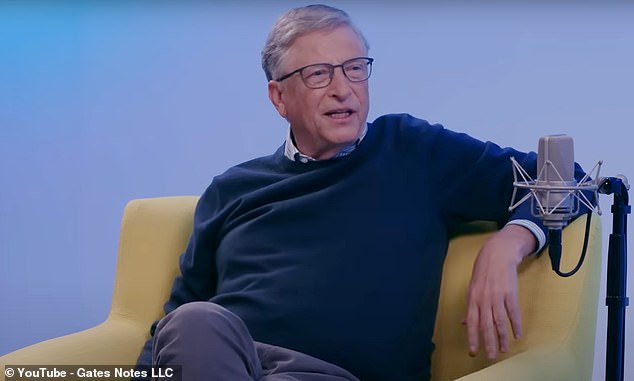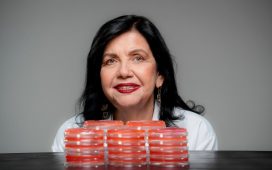While Microsoft co-founder Bill Gates remains optimistic about the social benefits of artificial intelligence, now even the billionaire mogul fears that AI could take his job.
The candid quip came during a recent podcast conversation with OpenAI CEO Sam Altman, whose company is responsible for the AI-powered chatbot ChatGPT.
Over the years, Gates has maintained that the three best career paths for recent graduates are those in alternative energy, health biosciences, and advancing artificial intelligence itself — but notably ‘billionaire philanthropist’ is not on that list.
‘I could even lose my job,’ Gates said on his podcast, ‘Unconfuse Me with Bill Gates.’
‘When the machine says to me, “Bill, go play pickleball, I’ve got malaria eradication. You’re just a slow thinker,”‘ he worried, ‘then it is a philosophically confusing thing.’

Over the years, Microsoft co-founder Bill Gates has maintained that the three best career paths for recent graduates are those in alternative energy, health biosciences, and advancing artificial intelligence (AI) itself — but notably ‘billionaire philanthropist’ is not on that list
![While Gates remains optimistic about the social benefits of AI, now even the billionaire mogul fears that it could take his job. 'When the machine says to me, "Bill, go play pickleball, I've got malaria eradication. You're just a slow thinker [...] it is a philosophically confusing thing'](https://www.businessfast.co.uk/wp-content/uploads/2024/04/1712976948_851_Bill-Gates-reveals-3-jobs-most-immune-to-the-AI.jpg)
While Gates remains optimistic about the social benefits of AI, now even the billionaire mogul fears that it could take his job. ‘When the machine says to me, ‘Bill, go play pickleball, I’ve got malaria eradication. You’re just a slow thinker […] it is a philosophically confusing thing’
‘I was very skeptical,’ Gates said about AI, in this conversation with Altman on the January 11, 2024 edition of his podcast. ‘I didn’t expect ChatGPT to get so good.’
He expressed his own bewilderment with how ‘large language model’ AIs like ChatGPT can process and imitate intricate textual information, like the works of William Shakespeare, with Altman chiming in that his team shared that confusion.
‘When OpenAI built GPT-1, they had no deep understanding of how it worked or why it worked,’ Altman confessed.
According to Altman, the company is now pursuing ‘interpretability research’ in order to more fully unpack all the intricacies and complexities that machine-learning and AI-training has done alone, away from the eyes of its initial coders.
Gates has increasingly focused both his podcast and his blog, ‘Gates Notes,’ on the future promise and ethical dimensions of AI.
‘We now have a better sense of what types of jobs AI will be able to do by itself and which ones it will serve as a copilot for,’ Gates said in a post on his 2024 predictions.
‘2023 marked the first time I used artificial intelligence for work and other serious reasons, not just to mess around and create parody song lyrics for my friends.’
‘And it’s clearer than ever how AI can be used to improve access to education, mental health, and more,’ Gates continued. ‘It motivates me to make sure this technology helps reduce — and doesn’t contribute to — the awful inequities we see around the world.’
One healthcare example Gates cited was that AI chatbots could make it easier for patients to learn about and better weigh their personal risks for HIV, noting that ‘for many people, talking to a doctor or nurse about their sexual history can be uncomfortable.’
Gates has put his money where his mouth is on the notion that health care, alternative energy-sector jobs and AI are the most important and viable sectors for the future of work.
This summer, the billionaire’s power company, TerraPower, will be building a novel nuclear power plant in Wyoming.
‘Making it clean, affordable and reliable will be essential for fighting poverty and climate change,’ as Gates put it to a graduating class of college students.
‘Biosciences,’ he said to those same college graduates, will remain a viable and worthwhile career path, because it is ‘ripe with opportunities to help people live longer, healthier lives,’ a set of skills and products that will always be in demand.
Today, Gates said, he still feels similarly about the promise of AI, although he admits we must ‘make smart investments now’ to ensure that ‘AI can make the world a more equitable place.’
‘Whether AI can help us, you know, go to war less, be less polarized — you’d think it should drive [human] intelligence,’ as Gates told Altman on his recent podcast.
‘So, I’d love to have people working on the hardest human problems, like whether we get along with each other,’ Gates added. ‘I think that would be an extremely positive if we thought the AI could contribute to humans getting along with each other.’










